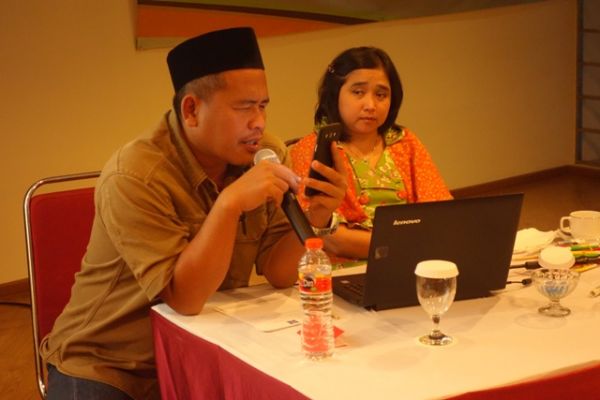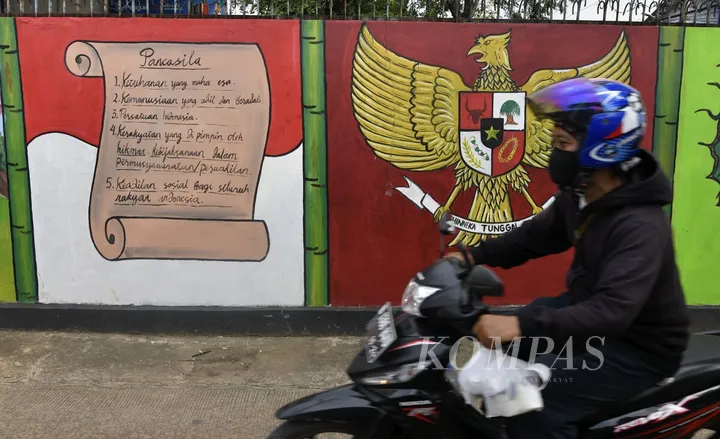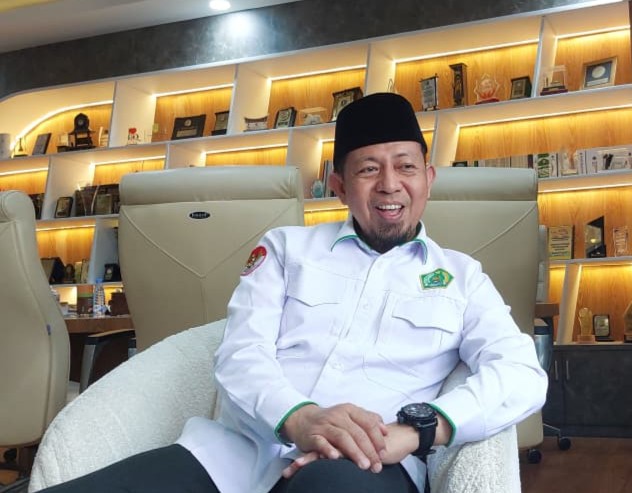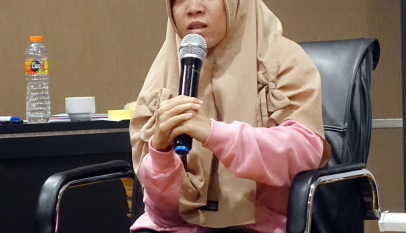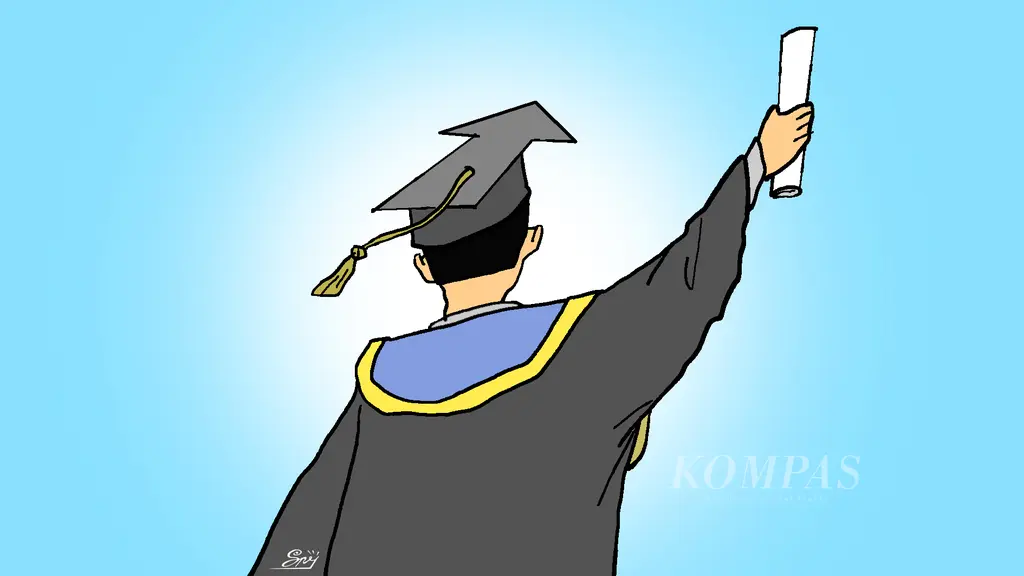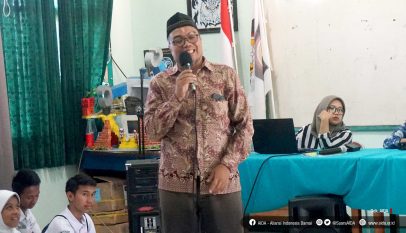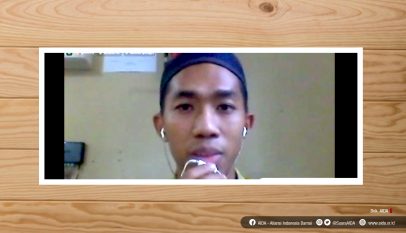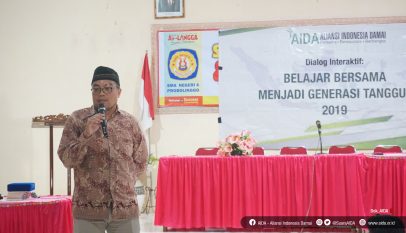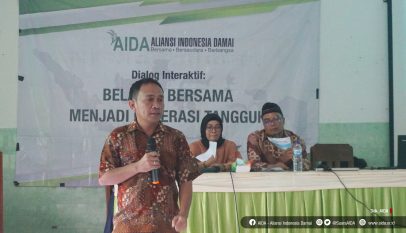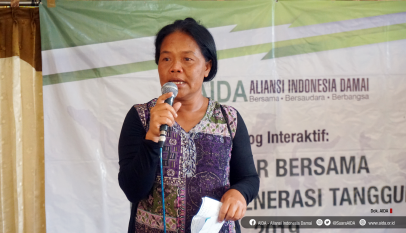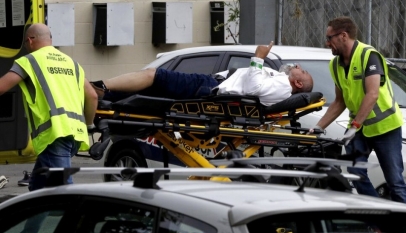DERADICALIZATION: Ex-terrorists, Victims Spread Peace
Again radicalisme: Former terrorist Ali Fawzi (left) speaks recently about the importance of peace, accompnied by Vivi, a victim of the 2002 JW Marriot bomb attack in Jakarta. The two have reconciled and have been participating together in seminars aimed ant curbing radicalisme among youth.
What could possibly happen when a repentant terrorist meets with a badly traumatized victim years after a deadly attack?
A real former terrorist, Ali Fawzi, and one of his real victims, Vivi Normasari, have a real answer: At first, they would suspiciosly stare at each other and engange in name-calling until they exhausted their negative energy before the ex-terrorist became overwhelmed by guilt and unable to fight back tears.
Ten they would hug – emotionnaly.
“I hated him. I was very angry because he kept smiling when telling the audience how he made bombs and how to use them. Ithought he was the most notorius man I had ever met,” said Vivi (40), recalling her first encounter with Ali in a joint forum at a high chool in Tangerang, Banten, two years ago.
Vivi, then a multinational bank employee, suffered serious injuries to her legs and hand in the JW Marriot bombing ini 2003, which killed 12 people and wounded another 150. She said she has found psychological trauma far more difficult to over come than her phisical injuries.
They met again in Jakarta this week as friends and fellow peace campaigners. A bomb making guru, Ali belonged to the Jamaah Islamiyah, and international terror network under Abu Bakar Ba’asyir. Police identified Ali as mentor of the JW Marriot attackers.
Vivi remember she would spend her days in solitude in her rooms after she los her job following the tragedy. She lost her appetite and could hardly sleep for many days. The most devastating moment was when she had to cancel her planned wedding that was at the time only four months away.
“We had been together for 11 years. I was too worried about my [disfigured] handa and fingers,” she said. “I couldn’t imagine shaking hands with my guest.”
Obviously, bringing together terror perpetrators and victims as part of a wider reconciliatory effort, like the one initiated by the Indonesian Peace Alliance (AIDA), is not easy because of the absence of trust between them.
Vivi recounted how she trembled with fear and anger the first time she faced off with Ali, even though she had tried hard to keep calm. He is a brother of Ali Imron and Amrozi, who were executed for their role in the 2002 Bali bombing, which killed 202, mostly Australians.
Ali was known as the mentor of not onli the JW Marriot bombers, but alsi a trainer of jihadists involved in the sectarian strife that claimed thousands of lives in Ambon and Poso in the late 1990s and early 2002. In 2004, he was arrested by the Philippines as he fought alongside Moro Islamic Liberation Front (MILF) rebels. He was repatriated to Indonesia in 2006. Repentant, he was recuited by the police to help them with with their counter-terrorisme strategy.
Just like Vivi , in fact Ali was equally scared the first time he confronted terrorist victims. He said he was hounded by guilt that grew out of the overwhelming regret that the victims were mostly innocent people and not the intended targets.
“Yes, I felt guilty. I could hardly sleep for weeks after I heard the survivors stories. The word ‘sorry’ wasn’t enough to express my regrets,” Ali said.
He felt miserable and wished to escape from the meeting room when survivors began to blame him for their mistery. So deep were his guilty feelings that he sipped several reconciliation meetings.
initially, Vivi did not believe Ale regretted the crimes he had committed, but her heart melted when she saw him weep during a meeting. The hugged.
A crying terrorist was a strange sight indeed. So I could believe ini his sincerity and forgive him, although it is still difficult to forget his crime,” Vivi said.
Now, they feel comfortable to sit side-by-side and share stories. The laugh and tearse each other.
“Being together with [terrorism] survivors convinces me that what we [terrorist] did was wrong and that those survivors are innocent people who have to unduly carry burdens resulting from our misdeeds,” Ali says.
A similarly thouching story was told by Sucipto, a survivor of the 2004 Australian embassy bombing, who befriended Iswanto, one of Ali’s trainees. Peacful coexistence has greatly helped them heal trauma.
“We would spend hours chatting and sharing stories never told before,” Sucipto says, recalling the days following their reconciliation meetings.
AIDA coordinator Hasibullah Satrawi is a proponent of reconciliation between ex-terrorist and victims. The NGO is and ardent critic of the laws that favor ex-terrorist and under the pretext of deradicalization programs, but neglect victims.
Unlike the government, which only recruits (former) terrorisme convicts in its deradicalization campaigns, AIDA alsi involves victims.
“Our peace campaign are targeting school students because at their tender age, they are highly vulnerable to radical ideologies,” Hasibullah said. [TS]
Sumber: Berita ini diambil dari harian The Jakarta Post, edisi Saturday May 28, 2016. hal, 2, ditulis oleh Nani Afrida.

